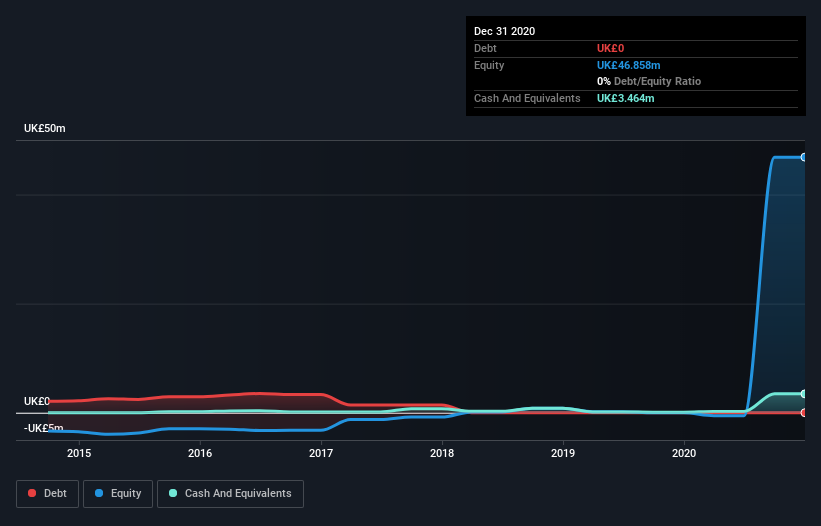- United Kingdom
- /
- Electrical
- /
- AIM:PHE
Companies Like PowerHouse Energy Group (LON:PHE) Are In A Position To Invest In Growth

There's no doubt that money can be made by owning shares of unprofitable businesses. For example, biotech and mining exploration companies often lose money for years before finding success with a new treatment or mineral discovery. Nonetheless, only a fool would ignore the risk that a loss making company burns through its cash too quickly.
So, the natural question for PowerHouse Energy Group (LON:PHE) shareholders is whether they should be concerned by its rate of cash burn. For the purpose of this article, we'll define cash burn as the amount of cash the company is spending each year to fund its growth (also called its negative free cash flow). The first step is to compare its cash burn with its cash reserves, to give us its 'cash runway'.
View our latest analysis for PowerHouse Energy Group
How Long Is PowerHouse Energy Group's Cash Runway?
A company's cash runway is the amount of time it would take to burn through its cash reserves at its current cash burn rate. In December 2020, PowerHouse Energy Group had UK£3.5m in cash, and was debt-free. Importantly, its cash burn was UK£1.8m over the trailing twelve months. Therefore, from December 2020 it had roughly 23 months of cash runway. That's not too bad, but it's fair to say the end of the cash runway is in sight, unless cash burn reduces drastically. The image below shows how its cash balance has been changing over the last few years.

How Is PowerHouse Energy Group's Cash Burn Changing Over Time?
In the last year, PowerHouse Energy Group did book revenue of UK£100k, but its revenue from operations was less, at just UK£100k. Given how low that operating leverage is, we think it's too early to put much weight on the revenue growth, so we'll focus on how the cash burn is changing, instead. The skyrocketing cash burn up 146% year on year certainly tests our nerves. It's fair to say that sort of rate of increase cannot be maintained for very long, without putting pressure on the balance sheet. Admittedly, we're a bit cautious of PowerHouse Energy Group due to its lack of significant operating revenues. We prefer most of the stocks on this list of stocks that analysts expect to grow.
Can PowerHouse Energy Group Raise More Cash Easily?
Given its cash burn trajectory, PowerHouse Energy Group shareholders may wish to consider how easily it could raise more cash, despite its solid cash runway. Generally speaking, a listed business can raise new cash through issuing shares or taking on debt. Commonly, a business will sell new shares in itself to raise cash and drive growth. By looking at a company's cash burn relative to its market capitalisation, we gain insight on how much shareholders would be diluted if the company needed to raise enough cash to cover another year's cash burn.
PowerHouse Energy Group has a market capitalisation of UK£167m and burnt through UK£1.8m last year, which is 1.1% of the company's market value. So it could almost certainly just borrow a little to fund another year's growth, or else easily raise the cash by issuing a few shares.
So, Should We Worry About PowerHouse Energy Group's Cash Burn?
Even though its increasing cash burn makes us a little nervous, we are compelled to mention that we thought PowerHouse Energy Group's cash burn relative to its market cap was relatively promising. Considering all the factors discussed in this article, we're not overly concerned about the company's cash burn, although we do think shareholders should keep an eye on how it develops. Taking a deeper dive, we've spotted 4 warning signs for PowerHouse Energy Group you should be aware of, and 3 of them shouldn't be ignored.
Of course PowerHouse Energy Group may not be the best stock to buy. So you may wish to see this free collection of companies boasting high return on equity, or this list of stocks that insiders are buying.
If you decide to trade PowerHouse Energy Group, use the lowest-cost* platform that is rated #1 Overall by Barron’s, Interactive Brokers. Trade stocks, options, futures, forex, bonds and funds on 135 markets, all from a single integrated account. Promoted
New: Manage All Your Stock Portfolios in One Place
We've created the ultimate portfolio companion for stock investors, and it's free.
• Connect an unlimited number of Portfolios and see your total in one currency
• Be alerted to new Warning Signs or Risks via email or mobile
• Track the Fair Value of your stocks
This article by Simply Wall St is general in nature. It does not constitute a recommendation to buy or sell any stock, and does not take account of your objectives, or your financial situation. We aim to bring you long-term focused analysis driven by fundamental data. Note that our analysis may not factor in the latest price-sensitive company announcements or qualitative material. Simply Wall St has no position in any stocks mentioned.
*Interactive Brokers Rated Lowest Cost Broker by StockBrokers.com Annual Online Review 2020
Have feedback on this article? Concerned about the content? Get in touch with us directly. Alternatively, email editorial-team (at) simplywallst.com.
About AIM:PHE
PowerHouse Energy Group
Designs non-recyclable waste regeneration facilities to produce electricity, heat, and gases comprising hydrogen and methane in the United Kingdom and internationally.
Moderate with adequate balance sheet.


